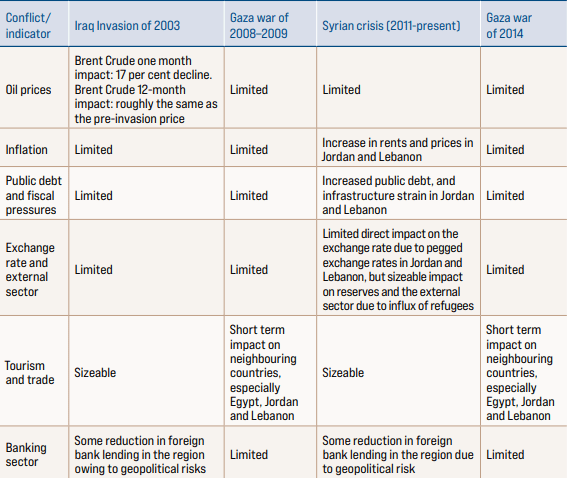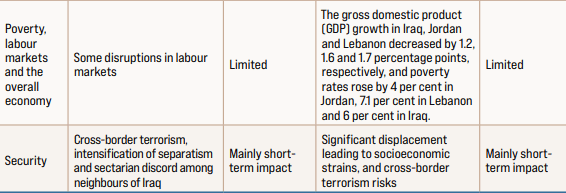A recent assessment by ESCWA and UNDP focused on the potential economic and human impact on the State of Palestine, with this policy brief extending the analysis to neighboring countries such as Egypt, Jordan, and Lebanon. While current data suggests regional repercussions have been contained, concerns arise about substantial spillover effects on neighboring nations if the conflict persists. Possible consequences include disruptions in energy supply, economic strain, inflation, currency depreciation, and social challenges. The conflict’s toll extends to Egypt, impacting its economy, tourism, and social sectors, compounded by existing vulnerabilities and external factors like the war in Ukraine.
Due to its close proximity to the conflict and existing economic ties with Israel, Jordan is grappling with socio-economic, diplomatic, and security challenges stemming from the Gaza war. As a major recipient of natural gas from Israel, the country faces potential disruptions in supply. Widespread protests and civilian boycotts targeting Israeli-linked brands are impacting retail and employment. The vital tourism sector has suffered a significant blow, with uncertainty regarding recovery until at least mid-2024. Jordan’s limited fiscal flexibility restricts the implementation of countercyclical measures, while servicing high debt levels hinders public expenditures for infrastructure and social protection. Unemployment remains persistently high, and despite controlled inflation, the purchasing power of vulnerable households hasn’t improved. Meanwhile, reduced humanitarian aid for Syrian refugees adds to fiscal concerns. In Lebanon, the aftermath of the Gaza war has resulted in numerous deaths, displacements, school closures, infrastructure damage, and a sharp decline in tourism. These already dire socio-economic conditions are expected to deteriorate further, including a continuing GDP decline, uncontrollable inflation, elevated unemployment, and widespread poverty, necessitating substantial assistance.
The estimates of the impact of the Gaza war, based on various assumptions and models, suggest that if the conflict persists for three months, the combined GDP loss in Israel, the occupied Palestinian territory, and the West Bank could be 1.3% of total GDP (approximately $5.7 billion). If the war extends to six months, the GDP loss may increase to 2.1% (around $9.5 billion). The main contributor to this economic decline is reduced tourism, with additional effects on investment, productivity, and trade potentially exacerbating the situation. Under the three-month scenario, the simulated upper-bound adverse impact on GDP is 2.3%, equivalent to $10.3 billion, while the six-month scenario could lead to a GDP loss of up to 4% (around $18 billion).
The projected decline in GDP is anticipated to impact poverty levels. Initial findings indicate that approximately 230,000 individuals in Egypt, Jordan, and Lebanon could experience a shift into poverty within a three-month period compared to the 2023 baseline. In the event of a six-month conflict, this figure might rise to over half a million people (see figure 2). Additionally, there is a potential for varying degrees of regression in human development, as measured by the Human Development Index, across these three countries, especially in the case of a prolonged six-month war.
In summary, the unprecedented loss of human life in Gaza and Israel is already contributing to economic setbacks in Egypt, Jordan, and Lebanon, with potential ripple effects on social conditions. The future toll may escalate due to reduced investments in both physical and human capital, placing additional strain on the already fragile resilience systems in these countries. A prolonged war could have more severe consequences for these nations and beyond, amplifying the economic impact on Israel. Estimated costs to Israel by the end of 2024 could reach 10% of GDP (approximately $50 billion) if the conflict lasts 8 to 12 months and is confined to Gaza without involvement from Iran, Lebanon, and Yemen. The extension of the war also raises the risk of additional actors becoming involved. A comprehensive and coordinated approach, involving international support and regional cooperation, is crucial. Financial aid, policy guidance, and technical assistance from the international community are essential to help affected countries mitigate the initial impact and prevent further regional spillovers. Above all, an immediate ceasefire is imperative to halt the destruction and despair inflicted by the Gaza war, averting the escalating economic costs in the region.
Regional spillovers of specific conflicts in the Middle East in neighboring countries:


Source: Expected socioeconomic impacts of the Gaza war on neighboring countries in the Arab region Summary, UNDP, ESCWA